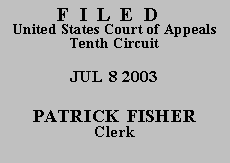

|
SUSAN NEVITT, |
|
Before SEYMOUR, MURPHY, and O'BRIEN, Circuit Judges.
Susan Nevitt, proceeding pro se, appeals the district court's dismissal of her civil rights complaint against New Mexico state court Judge Thomas Fitch and its decision to strike her "Notice by Plaintiff of Filing a Peremptory Challenge to District Judge" (the "Notice"). This court exercises jurisdiction pursuant to 28 U.S.C. § 1291 and affirms.
In striking the Notice, the district court noted that it was based on a New Mexico Supreme Court decision which allows any party the right to exercise a peremptory challenge to a state district court judge for any reason. The district court noted, however, that no such right exists under federal law and that the decision of the New Mexico Supreme Court was not binding on a federal district court. As to Nevitt's underlying civil rights complaint, the district court noted that Judge Fitch is absolutely immune from suit for civil liability for acts taken in his judicial capacity unless he acted in the acted in the clear absence of all jurisdiction. See generally Stump v. Sparkman, 435 U.S. 349 (1978). Because Nevitt had not alleged any facts indicating Judge Fitch acted in the absence of jurisdiction, and because the record affirmatively indicated the underlying state court water dispute was within Judge Fitch's jurisdiction, the district court concluded Judge Fitch was entitled to absolute immunity.
This court reviews de novo a district court's dismissal of a complaint on judicial immunity grounds, using the same standards it employs when reviewing a dismissal under Fed. R. Civ. P. 12(b)(6). See Ledbetter v. City of Topeka, 318 F.3d 1183, 1187 (10th Cir. 1999). Upon de novo review of the district court order of dismissal and consideration of the parties' briefs and the entire appellate record, this court AFFIRMS for substantially those reasons set out by the district court in its order of dismissal dated December 31, 2002.
ENTERED FOR THE COURT
Michael R. Murphy
Circuit Judge
*. This order and judgment is not binding precedent, except under the doctrines of law of the case, res judicata and collateral estoppel. The court generally disfavors the citation of orders and judgments; nevertheless, an order and judgment may be cited under the terms and conditions of 10th Cir. R. 36.3.